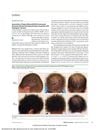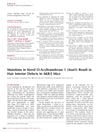1 citations,
September 2020 in “Journal of dermatology” Researchers found a new mutation in the LIPH gene of a woman with a rare hair condition.
 February 2023 in “Journal of dermatology”
February 2023 in “Journal of dermatology” The first Japanese case of a genetic hair disorder caused by specific mutations in the LIPH gene was identified.
194 citations,
November 2006 in “Science” A genetic mutation in the LIPH gene causes hair loss and growth defects.
7 citations,
February 2011 in “Journal of dermatology” The 736T>A mutation in the LIPH gene is common in Japanese people with autosomal recessive woolly hair.
 August 2016 in “Journal of Investigative Dermatology”
August 2016 in “Journal of Investigative Dermatology” Researchers found a new genetic mutation linked to a hair condition in a Japanese boy.
 May 2024 in “Frontiers in medicine”
May 2024 in “Frontiers in medicine” A genetic mutation in the LIPH gene causes tightly curled hair that stops growing in some Japanese individuals.
September 2016 in “Journal of dermatological science” The conclusion is that the variation in hair thinness in patients is mostly due to the amount of underdeveloped hairs, and treatments that thicken fine hairs might work for those with mild to severe conditions.
 1 citations,
February 2009 in “Journal of Investigative Dermatology”
1 citations,
February 2009 in “Journal of Investigative Dermatology” Lipase H is important for hair follicle function and shaping hair fibers.
 April 2012 in “Encyclopedia of Life Sciences”
April 2012 in “Encyclopedia of Life Sciences” Different genes are linked to various types of hair loss.
March 2022 in “Journal of cosmetic dermatology” Botanical extracts can help treat hair loss in people with certain genetic conditions.
 5 citations,
July 2020 in “JAMA Dermatology”
5 citations,
July 2020 in “JAMA Dermatology” Minoxidil solution applied twice daily improved hair growth in patients with Woolly Hair/Hypotrichosis due to LIPH gene issues, with mild side effects.
49 citations,
November 2021 in “Annual review of pathology” Lysophospholipids like LPA and S1P are important for hair growth, immune responses, and vascular development, and could be targeted for treating diseases.
 13 citations,
April 2018 in “Scientific Reports”
13 citations,
April 2018 in “Scientific Reports” The genes KRT25 and SP6 affect curly hair in horses, with KRT25 also causing hair loss. If both genes are mutated, the horse gets curly hair and hair loss. KRT25 can hide the effect of SP6.
Genetic analysis of rabbits identified key genes for traits like coat color, body size, and fertility.
 47 citations,
January 2013 in “International Journal of Cosmetic Science”
47 citations,
January 2013 in “International Journal of Cosmetic Science” Hair diversity is influenced by complex genetics and environmental factors, requiring more research for practical solutions.
11 citations,
April 2012 in “Journal of Investigative Dermatology” A specific mutation in PA-PLA1α causes abnormal hair growth.
 36 citations,
August 2018 in “Dermatologic Clinics”
36 citations,
August 2018 in “Dermatologic Clinics” Trichoscopy is a useful tool for diagnosing hair disorders without pulling out hair.
 November 2019 in “Harper's Textbook of Pediatric Dermatology”
November 2019 in “Harper's Textbook of Pediatric Dermatology” Understanding normal hair growth and loss in children is key to diagnosing and treating hair disorders.
 8 citations,
December 2020 in “Scientific reports”
8 citations,
December 2020 in “Scientific reports” Selective breeding caused the unique curly hair in Mangalitza pigs.
 1 citations,
October 2013 in “Expert Review of Dermatology”
1 citations,
October 2013 in “Expert Review of Dermatology” Diagnosing alopecia areata is challenging and requires careful examination and various tests to distinguish it from other hair loss types.
 5 citations,
November 2022 in “Animal Genetics”
5 citations,
November 2022 in “Animal Genetics” Genomic research can help improve the quality and production of natural fibers in animals.
 January 2025 in “BMC Genomics”
January 2025 in “BMC Genomics” Key genes and RNA networks regulate hair growth and follicle density in Rex rabbits.
 23 citations,
June 2010 in “Journal of Investigative Dermatology”
23 citations,
June 2010 in “Journal of Investigative Dermatology” A mutation in the Soat1 gene causes hair structure defects and other health issues in AKR/J mice.
 95 citations,
February 2019 in “The New England Journal of Medicine”
95 citations,
February 2019 in “The New England Journal of Medicine” Mutations in the PADI3 gene are linked to a higher risk of scarring hair loss in women of African descent.
Researchers made a mouse model with curly hair and hair loss by editing a gene.
210 citations,
February 2008 in “Nature genetics” Mutations in the P2RY5 gene cause autosomal recessive woolly hair.
2 citations,
July 2021 in “Genes” A specific genetic change in the KRT71 gene causes a hair loss condition in Hereford cattle.
 September 2023 in “International journal of science and healthcare research”
September 2023 in “International journal of science and healthcare research” Genetic testing is crucial for diagnosing congenital atrichia, a rare condition causing irreversible hair loss.
24 citations,
December 2018 in “Inflammation and Regeneration” Phospholipase A2 enzymes play key roles in skin health and disease.
 August 2016 in “Journal of Investigative Dermatology”
August 2016 in “Journal of Investigative Dermatology” The research found that certain microRNAs are important for human hair growth and health.

















